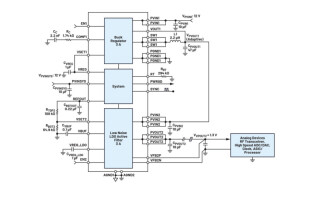Why Remote Freelance Contracting is a Compelling Choice for a Covid-Impacted Embedded Engineering Market
March 01, 2022
Blog

The Covid-19 pandemic has caused major disruption throughout the world and has delivered a new "norm" for working practices. Suddenly, whole teams are working from home, but many companies were totally unprepared for this and lacked the investment and foresight to make sure employees' needs were met in their new home office environments.
Although employees regarded the move as a solution to maintaining a healthy work-life balance from the onset, some viewed the distractions of the home, not being properly set up, or not having the right connectivity and communications with work colleagues as a major negative.
And as restrictions get lifted further, will this new norm be sustainable, or will companies try to get back to how they were prior to Covid?
Remote/Freelance Home Needs
In the engineering and electronics sectors, embedded engineers having the option to work from home is dependent on a few factors.
- How big are your systems? If the devices fit on your desk you can do a lot from home.
- How close do you work with the hardware? If you are just creating embedded software, you can do that from home. But if you are doing initial testing and start-up, you might need a lab and/or expensive equipment. Most of the development could be done from home, but there may be a need to pop into the office to make hardware changes or run some lab-based tests.
- The office lab must be well managed and maintained, and all devices remotely accessible.
- There needs to be a trust by management that the engineer will be just as productive at home, if not more so, as they are working in the office.
However, the solution has not been as easy as sending engineers home and helping them set up. There have been a number of other issues complicating the ability to complete engineering projects efficiently and cost-effectively.
Worldwide Economic Threats
There is a global scarcity of highly-skilled talent, and often a mismatch of skills that leaves projects delayed or canceled. As a fragile job security and a productivity slowdown disrupted the economy, household purse strings grew tighter. Major purchases such as new cars were no longer essential with a vast amount of the workforce operating from home.
The supply chain suffered as the chip shortage stunted the automotive and other electronic manufacturing. People stopped making major purchases, and growth and innovation in these sectors became seriously halted, which has had a profound effect on unemployment.
The Need to Change the Engineering Workforce Process
Despite the various roadblocks, companies still need to maintain productivity levels, so it has been necessary to adapt the engineering workforce differently.
To counter the lack of skilled engineers available, companies are now considering what a remote, on-demand, better-skilled engineering workforce could accomplish. If companies pay only for vital tasks as needed and are able to choose from a wider range of geographically dispersed workers, they can better manage the bottom line. These specialists are generally used on short-term contracts, utilizing their top-level expertise in high-productivity and quick-turnaround situations. Engineers often deliberately choose this path as a flexible, profitable enterprise to achieve work-life balance in a productive work environment.
Clients are Reacting Positively to Remote Freelancing
Traditionally, some electronics companies have been reluctant to hire freelance embedded engineering contractors because they were working from home and they could not be seen every day.
During the pandemic, employers in the engineering sector have begun to realize there are considerable benefits to employing remote engineers, including potentially lower costs, higher employee engagement, higher productivity, and greater access to talent.
Additionally, clients are reacting favorably to working with remote freelance contractors because they can select candidates with skill levels that match the requirements of the project without being restricted by geographical boundaries. Even before the pandemic, remote jobs were increasing rapidly because of the cost and productivity advantages.
For contracting positions in the embedded engineering market, remote working is now estimated to be 85% of total business, compared to 30-40% pre-Covid — it was then more of an onsite/offsite hybrid scenario.
In the majority of cases, clients are now asking a contractor to be present on site only if there is a specific physical necessity or if it’s the contractor's preference. This flexibility has allowed them to consider working with expert consultant contractors who are immediately available rather than gearing project start-ups around getting skills on-site. With relocation no longer posing an issue, the lead-time to start a project can be greatly reduced.
Acceleration in the Need for Contract Freelancers
The pandemic has injected the global economy with a sense of urgency in completing projects against a backdrop of hiring freezes and a need to reduce headcount. Upwork CEO Hayden Brown told Fortune reporters that they’ve seen explosive growth in new freelancer registrations and business requests for workers since the COVID-19 crisis began. Even though economic activity has stalled, she attributes this increase to specific, project-related needs and greater confidence in the effectiveness of remote, temporary workers.
Businesses that were already moving toward a leaner workforce have accelerated their efforts out of necessity. Companies that may have been resistant to remote work or using contractors on a project-by-project basis discovered that their workers were just as effective from home as they were in the office. Not having to pay for long-term employment (including benefits and payroll taxes) or office space is a key factor that helps companies save a lot of money.
This is especially suitable for companies that expect or need flexibility with their projects. Successful freelancers are agile by definition, even if they are working for multiple clients at the same time or take on short-term roles with limited ramp-up times. They get used to setting up their own environments and hit the ground running better than in-house employees.
As costs for contract engineers largely come out of a project budget rather than corporate salaries, the overall headcount and budget and can be easily controlled. Their focus is on the work and not on the office politics.
Is the Change Towards Hiring Remote Engineers Sustainable?
I expect to see the trends toward a leaner, project-based workforce continue beyond the current crisis as companies adapt to the new norm. The pandemic has forced companies to look at using outside help for the first time, and we believe most businesses have considered it a roaring success and will continue enlisting remote and freelance contract help in the future.
Electronics organizations have also recognized that some tasks need to be done on site and respect that employees want the ability to meet with colleagues in the office setting, so some hybrid working practices will be adopted to keep the workforce happy. However, productivity is the key, and I believe that as the impacts of COVID, skills shortages, and chip shortages continue affecting the electronic engineering market, the requirement for flexibility and skill levels offered by professional freelance embedded engineering contractors will become more important to companies' strategies.





